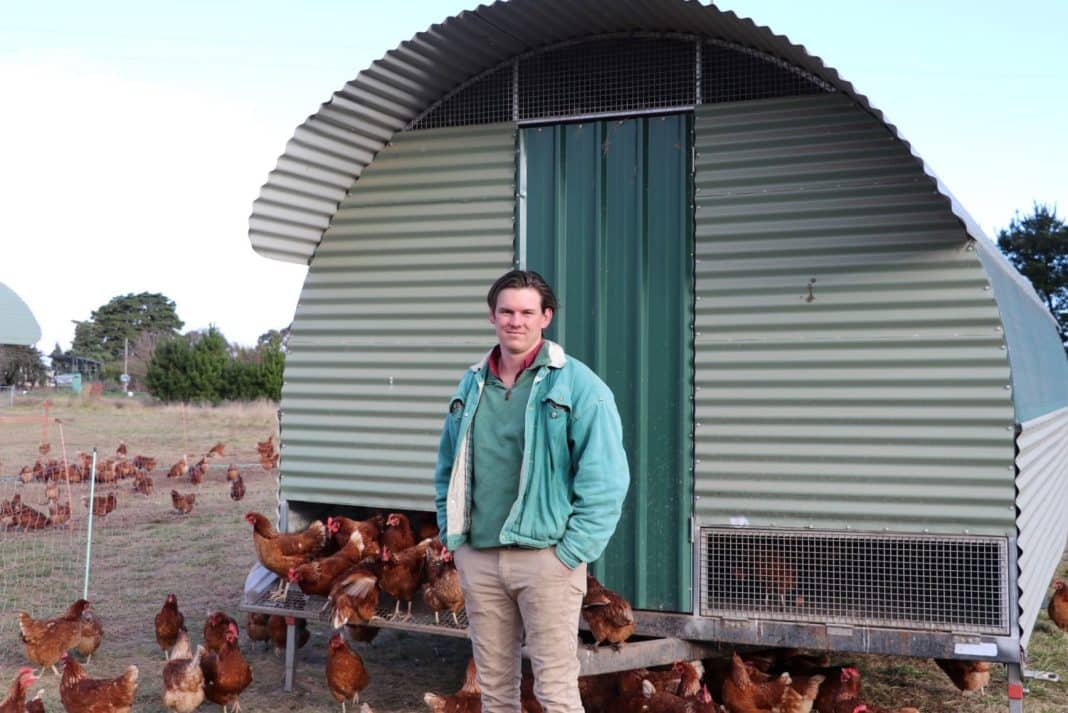Fred McGrath Weber’s passion for regenerative and holistic farming has led him to be a finalist for this year’s Steadfast Young Landcare Leadership Award, and he says it’s a testimony to the people around him and the opportunities he’s been given.
Voted president of the ACT Rural Landholders Association, Fred has also been an integral part of the food and fibre strategy development – the ACT’s first agricultural policy focusing on urban gardening and vertical farms.
“For us, caring for the environment is a huge factor in everything we do, and connecting nature reserves like Mount Ainslie all the way through our property has flow-on effects to benefit the production of our farming land while also looking after our livestock,” he says.
“Last year when we were lambing, there was so much rainfall and there’s lots of risk with that because lambs were being born in horrible conditions. So, we were able to utilise our tree lines and put the sheep under cover, and most farmers wouldn’t really have that luxury.
“In addition to what we do, we’re encouraging the birdlife and bees with the tree lines, and we also really focus on soil health by having a mobile chicken shed rotating around the paddocks. When their droppings fall through onto the ground, all that is going into the soil and improving its health and then that has flow-on effects with our planting of crops or just pasture to feed sheep.”
The mobile chicken shed is an iconic Majura Valley Farm feature, and Fred is pretty proud of the work he and his family have done to produce this holistic approach to chicken farming.
With 11 sheds in total across the property, 300 chickens live in each, always having complete access to water and food, along with a safe and secure home.
“The rollaway nesting boxes make the eggs come out clean and everyone’s always got really good feedback on the quality of the eggs. ‘Best eggs I’ve ever ‘had’ is not something we haven’t heard multiple times.”
“The rollaway nesting boxes make the eggs come out clean and everyone’s always got really good feedback on the quality of the eggs. ‘Best eggs I’ve ever ‘had’ is not something we haven’t heard multiple times,” he smiles.
The flow-on effect from the chicken sheds has increased and improved the farm’s vegetable production by enhancing soil quality.
“With the production of our corn, we sell that to the consumer, and we also have lambs we sell to the consumer in half-lamb boxes,” Fred says.
“We also have the market garden that my partner Zoe has been establishing. So that is, again, direct to the consumer. We’re growing lots of vegetables there, and the next big enterprise is the sheep milk dairy.
“In Canberra, 98 per cent of all our leafy greens come from Sydney. So, a high amount of produce is sourced from hundreds of kilometres away – there’s a real disconnect. I think the more that people can produce food in the capital, the more it will benefit the whole system with less food waste, because people actually care more about it.”
Fred and his family have big plans for Majura Valley Farm, hoping to draw the Canberra community in with their massive potential for agritourism.
Keep your eyes peeled over the next few years for weddings and functions, and farm-to-table restaurants and cafes, and make sure you try a farm fresh egg – they’re ‘the best’ in Canberra.
The National Landcare Conference and Awards will be held on 23-25 August; find out more at nationallandcareconference.org.au
Canberra Daily would love to hear from you about a story idea in the Canberra and surrounding region. Click here to submit a news tip.



